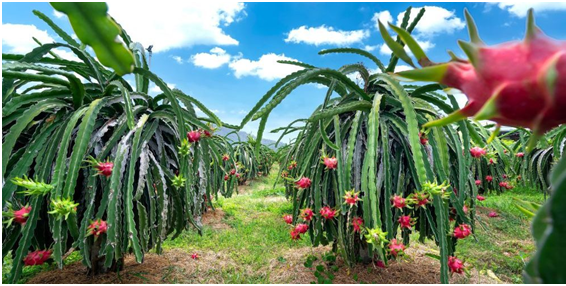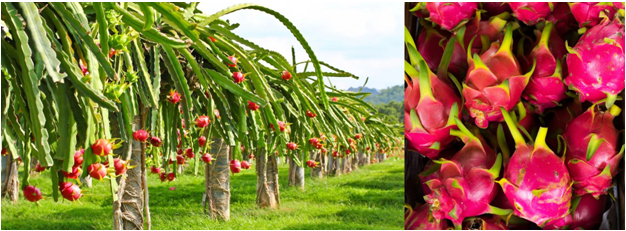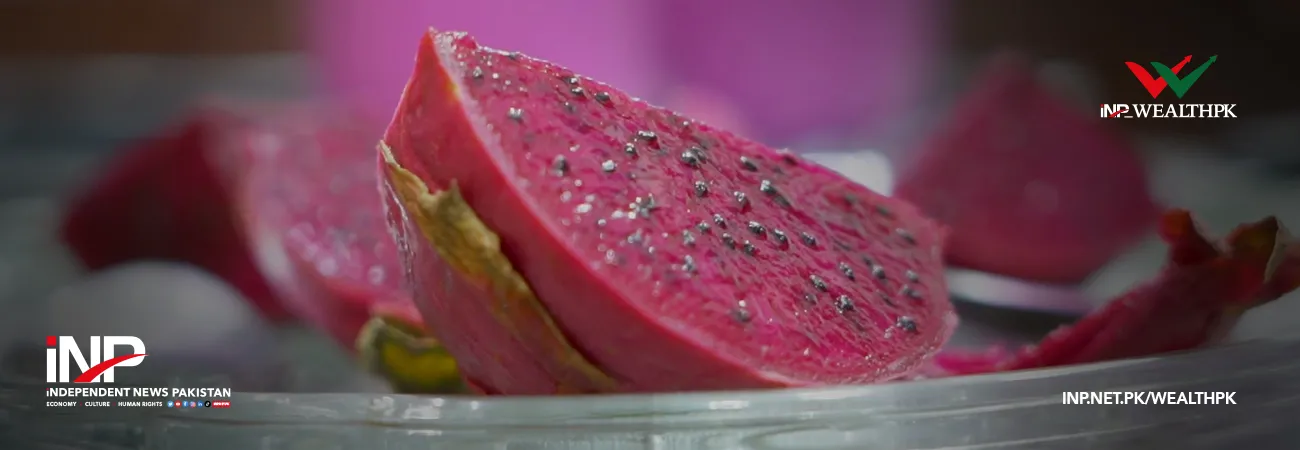INP-WealthPk
Azeem Ahmed Khan
Dragon fruit, native to South America, is rapidly gaining popularity in Pakistan as farmers turn to its cultivation for higher profitability and easier management. The exotic fruit, known for its vibrant appearance and health benefits, has shown promising results in local soil and climate conditions.

Widely cultivated in countries such as China, Vietnam, Sri Lanka, Malaysia, Indonesia, and India, dragon fruit is a low-calorie, nutrient-rich option increasingly recommended by nutritionists. Its growing demand in both local and international markets, combined with minimal input requirements, is making it an attractive alternative for progressive Pakistani farmers.
Dr Mohammad Asif, Chief Executive Officer of Number One Organics Private Limited, Rahim Yar Khan, has been working to promote dragon fruit farming in Pakistan. Talking to WealthPK, he said dragon fruit farming began in the country about six years ago on a small scale. “His company is not only engaged in promoting more than 100 types of high-quality imported varieties of dragon fruit, out of the 250 known globally, but also supports farmers by providing affordable organic fertilizers to boost local cultivation,” he added.
At present, dragon fruit is sold at premium prices through major stores and online platforms, largely due to its dependence on imports. However, once local production further scales up, Asif believes it will become available at regular fruit shops across the country. Highlighting the fruit’s value addition methods, he said it can be used for making jam, jelly, milkshakes, ice cream, and qahwa, a coffee-like drink.
Asif said the dragon fruit is not only attractive and tasty, but also holds high medicinal value. “It is rich in vitamin C, A, B1, B2, and B3, and also contains essential minerals such as potassium, phosphorus, iron, calcium, and protein.” The fruit’s high fibre content and low-calorie nature make it an ideal natural supplement for health-conscious individuals, including diabetic patients. It is also good fruit for boosting immunity, improving digestion, and promoting heart health, he added.

Asif said the plant requires careful handling. “Although it is a cactus, it belongs to tropical rainforests like those in Indonesia, Thailand, and Malaysia – unlike desert cacti, it needs plenty of water but cannot tolerate stagnant water around its stem, as it leads to stem decay and fruit damage,” he said.
“The plant can be grown throughout Pakistan, but performs best in tropical regions such as Karachi and Thatta. Special precautions are necessary in snowy regions, where prolonged snow on the plant can freeze the pulp inside the stem, causing the plant to die after defrosting,” Asif said. “Similarly, in desert areas like Cholistan, shading nets are essential to protect the plant from extreme heat.”
One of the notable advantages of dragon fruit is that it can be grown on barren land, although productivity would be lower than on fertile lands, he said. Dragon fruit’s initial harvest yields two to three tons per acre, but mature plants (after four years) can produce up to 14 tons. While the planting cost per acre is comparable to that of other crops, it offers significantly higher profits, he said. Each plant, with a lifespan of around 25 years, currently sells for between Rs300 and Rs1,500, depending on the variety of the plant, he added.
Asif emphasised that dragon fruit is largely pest-resistant, requires only simple organic fertilizers, and does not rely on chemical inputs. “Among the varieties, the white-flesh dragon fruit is most in demand worldwide due to its lower sugar content and higher fiber, making it a favourable option for diabetic and health-conscious consumers,” he added. He advised farmers to select the best quality, self-pollinated varieties suitable for their local climate and to take care during the early growth stages by shielding the plants from extreme heat or snow.
As part of his company’s efforts, they have distributed over 4,000 free plants and helped establish more than a dozen dragon fruit farms across Pakistan, he added. Asif said that in order to promote commercial dragon fruit farming in Pakistan, he has also launched a YouTube channel titled “Pitahaya (Dragon Fruit) Pakistan” to provide guidance to farmers.
Credit: INP-WealthPk













